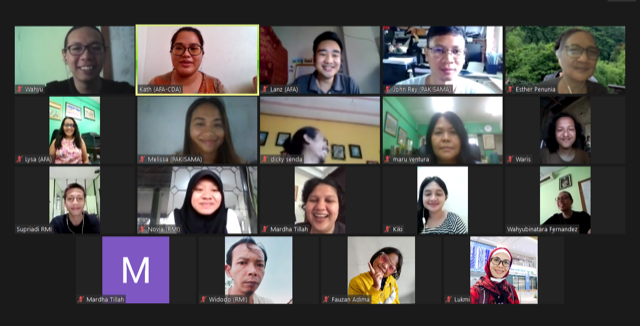June 25, 2020. What do you think makes you an indigenous young farmer and what does it mean? How do you perceive your identity as a young farmer of an indigenous community when modernization and digital technology are transforming cultures and economies? How can you strengthen your culture amidst modernity such that environmentally sustainable and just practices are still practiced and promoted?
These are deep questions that 50 young farmers from indigenous communities from Indonesia and Philippines will try to answer, through a project entitled “Being and Becoming Indigenous”, to be implemented by lead organization Indonesian Institute for Forest and Environment (RMI) with partners Asian Farmers’ Association for Sustainable Rural Development (AFA), Pambansang Kilusan ng mga Samahang Magsasaka (PAKISAMA), and Lakoat Kujawas (LK).
AFA organized a kickoff meeting to launch this project last June 23-24, 2020 through Zoom. The project, titled “Being and Becoming Indigenous,” aims to understand the youth’s concept of indigeneity in the middle of the modern era. The project will run from June 2020 until March 2021 in selected indigenous communities in Indonesia and the Philippines. This is supported by VOICE, a global innovative grant facility that supports the most marginalized and discriminated people in 10 low-income countries is Africa and Asia.
The indigenous youths that will participate in the said project are Kasepuhan Pasir Eurih and Mollo Indigenous Peoples in Indonesia, and the Agta-Dumagat-Remontado Community in the Philippines. In addition to knowing more about their concept of indigeneity, the project also aims to understand and address the limited access of indigenous youth to resources and their limited participation in their indigenous culture.
The first session of the kick-off meeting was dedicated to gathering information on the current situation faced by the indigenous youth. Each community leader shared their key issues or challenges faced, the initiatives they have done in response to these issues, and their recommendations on how indigenous youth can be organized in their communities.
During the second session of the kickoff meeting, AFA, RMI, PAKISAMA, and LK focused on project management in terms of policies and other guidelines that will serve as the foundation of the project. The team aims to conduct workshops and leadership activities for the indigenous youth to improve their understanding of the position of their cultural identity in the midst of modernity.
Though the Indonesian and Philippine communities have differing cultures, they have similar experiences with regards to indigenous youths. Communities are facing challenges in terms of the lack to access to land, lack of educational opportunities, decline in marketing produce, food sovereignty, discrimination of IP youth, the decline in the youth’s participation in traditional cultural practices, and issues brought upon by COVID-19 such as farmers that are engaged in the tourism business who have no source of income due to the pandemic.
For initiatives in response to issues they are facing, the community leaders talked about how they organized groups for the youth in their communities, their sustainable agriculture practices, social businesses and cooperatives, and activities they have done to revitalize the community’s cultural practices.
The indigenous community leaders shared that they need support from government and non-government organizations. They also shared that various methods should be used in order to engage the indigenous youth in participating. Lastly, they also recommended the important role of elders in guiding the youth.
AFA, RMI, PAKISAMA, and LK have scheduled another meeting to plan and design the communication plan, knowledge management materials, training design, and monitoring and evaluation materials to further guide the implementation of the project. #




Comments are closed